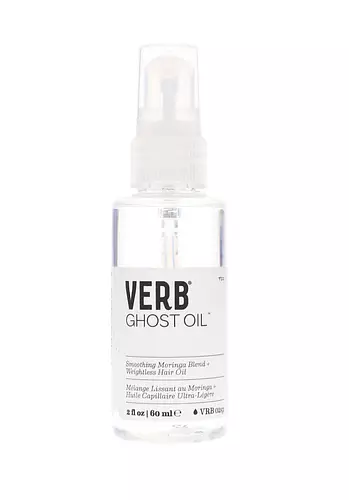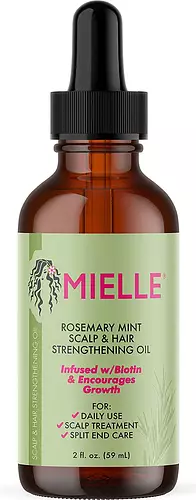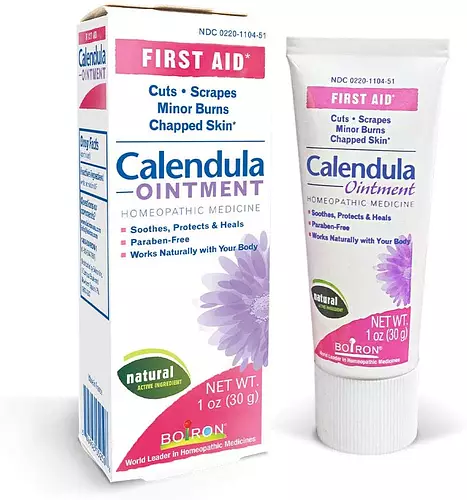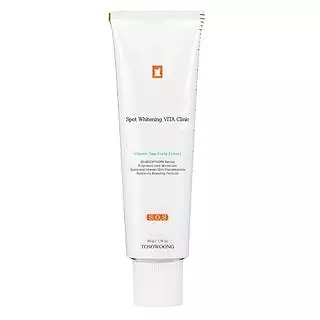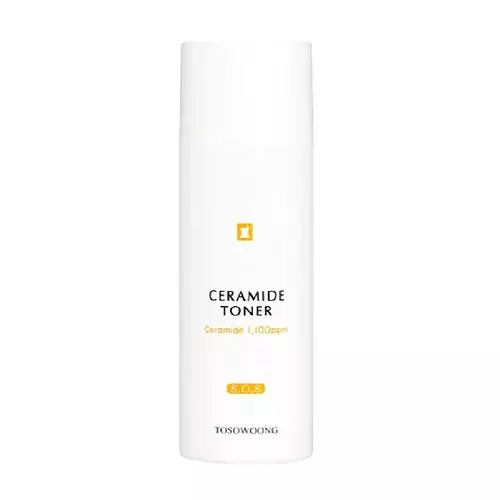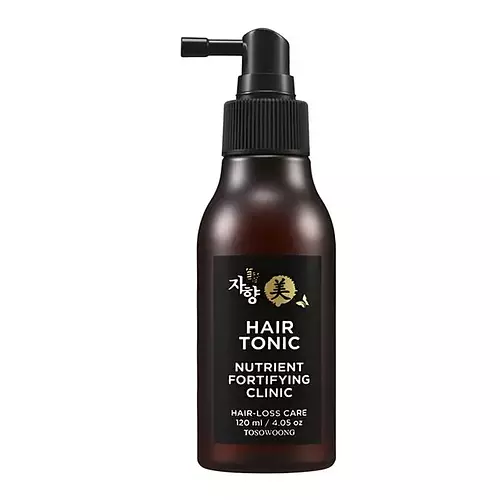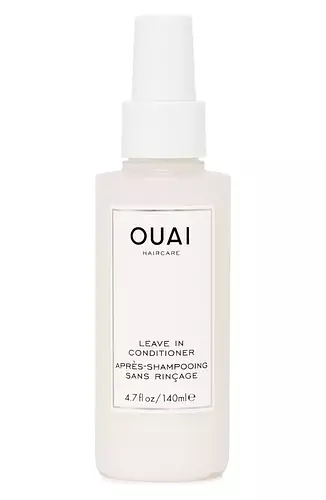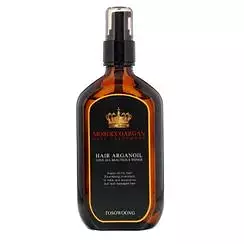
Tosowoong Morocco Argan Hair Oil Ingredients Explained
Published on March 02, 2023 Submitted by screamadelica
Overview
What it is
Hair oil with 19 ingredients that contains Vitamin E
Cool Features
It is reef safe
Suited For
It has ingredients that are good for dry skin, brightening skin and sensitive skin
Free From
It doesn't contain any harsh alcohols, parabens or sulfates
Fun facts
Tosowoong is from South Korea. This product is used in 4 routines created by our community.
We independently verify ingredients and our claims are backed by peer-reviewed research. Does this product need an update? Let us know.
Hair oil with 19 ingredients that contains Vitamin E
Quick info
- Argania Spinosa Kernel Oil
- Helianthus Annuus Seed Oil
- Olea Europaea Husk Oil
- Simmondsia Chinensis Seed Oil
- Vitis Vinifera Seed Oil
- Citrus Aurantium Dulcis Oil
- Lavandula Angustifolia Oil
- Citrus Aurantium Bergamia Fruit Oil
- Geranium Maculatum Oil
- Santalum Album Oil
- Rose Flower Oil
- Chamomilla Recutita Flower Oil
- Commiphora Myrrha Oil
You should know
Notable Ingredients
This product contains 1 ingredient that may have this attribute:
Benefits
This product contains 3 ingredients that may have this attribute:
This product contains 1 ingredient that may have this attribute:
This product contains 1 ingredient that may have this attribute:
This product contains 1 ingredient that may have this attribute:
Concerns
This product contains 1 ingredient that may have this attribute:
This product contains 1 ingredient that may have this attribute:
Ingredients 19
Cyclopentasiloxane is a silicone used to improve texture and trap moisture. An easier name for this is D5.
Dimethicone is a silicone used for making products smooth and silky. It also has the added benefit of sealing in hydration. The amount of dimethicone found in beauty products is considered safe and non-comedogenic, meaning it won't clog pores.
Argania Spinosa Kernel Oil is derived from the kernels of the argania spinosa tree. You may know it as argan oil.
Helianthus Annuus Seed Oil is the oil derived from the seeds of a Sunflower. Sunflower seed oil is non-fragrant. It is an emollient, meaning it helps to soften the skin.
Olea Europaea Husk Oil is an oil and isn't fungal acne safe.
This ingredient is the fixed oil extracted from seeds of the desert shrub Jojoba. It is more commonly known as jojoba oil. The seed oil is liquid wax ester from the plant. It is non-comedogenic.
Vitis Vinifera Seed Oil comes from the grape vine. Grape seeds are a byproduct of creating grape juice or wine.
Citrus Aurantium Dulcis Oil comes from the bitter orange, an orange native to Southeast Asia.
Lavandula Angustifolia Oil is more commonly known as lavender essential oil. Lavandula Angustifolia is known as the English Lavender and famous for creating purple fields in Provence, France.
Citrus Aurantium Bergamia Fruit Oil is the oil from the bergamot orange. This bergamot is native to Italy.
Santalum Album Oil is created from the Santalum album, or the East Indian sandalwood tree. This oil has fragrance and masking properties due to its unique scent.
Chamomilla Recutita Flower Oil comes from the chamomile flower (like the tea you drink).
Commiphora Myrrha Oil is the volatile oil obtained by the steam distillation of the Myrrh, Commiphora myrrha, Burseraceae
Tocopheryl Acetate is AKA Vitamin E. It is an antioxidant and protects your skin from free radicals. Free radicals damage the skin by breaking down collagen.
Caprylyl Glycol is a humectant and emollient, meaning it attracts and preserves moisture.
Ethylhexylglycerin (we can't pronounce this either) is commonly used as a preservative and skin softener. It is derived from glyceryl.
Cyclopentasiloxane, Dimethicone, Argania Spinosa Kernel Oil, Helianthus Annuus Seed Oil, Olea Europaea Husk Oil, Simmondsia Chinensis Seed Oil, Vitis Vinifera Seed Oil, Citrus Aurantium Dulcis Oil, Lavandula Angustifolia Oil, Citrus Aurantium Bergamia Fruit Oil, Geranium Maculatum Oil, Santalum Album Oil, Rose Flower Oil, Chamomilla Recutita Flower Oil, Commiphora Myrrha Oil, Styrax Benzoin Gum, Tocopheryl Acetate, Caprylyl Glycol, Ethylhexylglycerin
Ingredient Ratings
Based on the number of likes and dislikes each ingredient has received.
Ingredients Explained
Cyclopentasiloxane is a silicone used to improve texture and trap moisture. An easier name for this is D5.
D5 is considered lightweight and volatile. Volatile means it evaporates quickly after application. Once evaporated, D5 leaves a thin barrier that helps keep skin hydrated.
D5 is an emollient. Emollients help soften the skin and prevent water loss. Silicones create a silky texture in products. D5 helps other ingredients become more spreadable.
Studies show D5 is safe to use in skincare products. We recommend speaking with a skincare professional if you have concerns.
Learn more about CyclopentasiloxaneDimethicone is a silicone used for making products smooth and silky. It also has the added benefit of sealing in hydration. The amount of dimethicone found in beauty products is considered safe and non-comedogenic, meaning it won't clog pores.
Dimethicone has been found increase absorption in skin, boosting the benefits of other ingredients. While there is concern for the safety of dimethicone, the levels used in skincare are safe for use.
Argania Spinosa Kernel Oil is derived from the kernels of the argania spinosa tree. You may know it as argan oil.
Argan Oil is an antioxidant, hydrating, and soothing ingredient.
Studies have shown argan oil can help fight again radical damage from the sun. This makes it effective at preventing hyperpigmentation.
Large amounts of vitamin E found in argan oil helps the skin retain water. Argan oil also contains fatty acids such as linoleic acid, oleic acid, and palmitic acid. It is also a good source of lipids.
Another benefit of argan oil is skin-soothing. It can help reduce inflammation-related skin symptoms.
Argan Oil is effective at regulating sebum production in pores. This can make it effective at treating hormonal acne.
Traditionally, argan oil was used for its antibacterial and antifungal properties. However, argan oil contains fatty acids that may make it not fungal-acne safe.
Argan Trees are native to Morocco.
Learn more about Argania Spinosa Kernel OilHelianthus Annuus Seed Oil is the oil derived from the seeds of a Sunflower. Sunflower seed oil is non-fragrant. It is an emollient, meaning it helps to soften the skin.
Sunflower seed oil contains many fatty acids. The fatty acids found in sunflower seeds include (from highest amount to least): linoleic acid, myristic acid, palmitic acid, stearic acid, arachidic acid, oleic acid, and linolenic acid.
These fatty acids help the skin create ceramides. Ceramides play a role in repairing the skin barrier.
Helianthus Annuus Seed Oil helps moisturize the skin. This in turn helps the skin look more rejuvenated and smoother.
Sunflowers are rich in vitamin E.
Historians believe Indigenous cultures of North America domesticated sunflowers before corn. Thus they relied on sunflower oil for a variety of uses. One such use is moisturizing skin and hair.
Sunflower seed oil may not be fungal acne safe. We recommend speaking with a professional if you have any concerns.
Learn more about Helianthus Annuus Seed OilOlea Europaea Husk Oil is an oil and isn't fungal acne safe.
This ingredient is the fixed oil extracted from seeds of the desert shrub Jojoba. It is more commonly known as jojoba oil. The seed oil is liquid wax ester from the plant. It is non-comedogenic.
Jojoba oil does not contain fragrance and has many fatty-acids, making it a great soothing ingredient. Jojoba contains Vitamin E, a great moisturizing ingredient. Vitamin E is also an antioxidant. Antioxidants help protect your skin against free-radical damage. This may help in anti-aging.
Jojoba seed oil is a humectant, meaning it helps draw moisture from the air. This helps keep your skin hydrated.
While jojoba has antibacterial properties, it is only able to kill some bacteria. It has also been shown to help in wound healing. Indigenous cultures have used jojoba as a moisturizer and to help treat burns.
It is found to be similar to natural human skin sebum, so it has a great effect on dry skin. Jojoba oil may even help with regulating sebum production.
Although jojoba oil is non-comedogenic, we recommend speaking with a professional about using this ingredient if you have any concerns.
Jojoba oil may not be fungal acne safe. We recommend speaking with a professional if you have any concerns.
Jojoba is native to the southwestern US.
Learn more about Simmondsia Chinensis Seed OilVitis Vinifera Seed Oil comes from the grape vine. Grape seeds are a byproduct of creating grape juice or wine.
The components of grape seeds have many skin benefits. Research has found it to be antimicrobial and anti-inflammatory. It also contains many potent antioxidants such as Vitamin E , Vitamin C, proanthocyanidins, polyphenols, flavonoids, and anthocyanins. Proanthocyanidin has been shown to help even out skin tone.
Antioxidants help fight free-radical molecules. Free-radical molecules are capable of damaging our cells and other genetic material. Antioxidants help stabilize free-radicals by donating extra electrons. Grape seed extract may help reduce the signs of aging.
The antimicrobial properties of grape seed may help treat acne. However, more research is needed to support this claim.
Grape seed has also been found to help absorb UV rays. Grape seed extract should not replace your sunscreen.
The fatty acids of grape seed oil give it emollient properties. Emollients help soothe and soften your skin by creating a film. This film traps moisture within, keeping your skin hydrated.
Learn more about Vitis Vinifera Seed OilCitrus Aurantium Dulcis Oil comes from the bitter orange, an orange native to Southeast Asia.
This orange is commonly used in cosmetics and food. It is a common ingredient for marmalade.
Citrus peels are often made up of mainly limonene, a fragrance with a citrus scent. They also contain flavonoids, which have anti-inflammatory properties.
Learn more about Citrus Aurantium Dulcis OilLavandula Angustifolia Oil is more commonly known as lavender essential oil. Lavandula Angustifolia is known as the English Lavender and famous for creating purple fields in Provence, France.
Lavender imparts a scent and may sensitize skin. It contains linalool, a known allergen.
While lavender essential oil is commonly used in aromatherapy to help alleviate symptoms of anxiety and stress, more research is needed to confirm this.
However, lavender essential oil has shown to have anti-inflammatory activity due to its prostanoids and histamine content.
Lavandula Angustifolia Oil is the volatile oil obtained from the flowers of the Lavender, Lavandula angustifolia, Labiatae. ISO 8902:2009
Learn more about Lavandula Angustifolia OilCitrus Aurantium Bergamia Fruit Oil is the oil from the bergamot orange. This bergamot is native to Italy.
Citrus Aurantium Bergamia Fruit Oil is used to add fragrance to products. It contains limonene, linalool, and linalyl acetate.
The term 'fragrance' is not regulated in many countries. In many cases, it is up to the brand to define this term. For instance, many brands choose to label themselves as "fragrance-free" because they are not using synthetic fragrances. However, their products may still contain ingredients such as essential oils that are considered a fragrance.
When used topically, Citrus Aurantium Bergamia Fruit Oil is a photosensitizer due to its furanocoumarins. Photosensitizers make the skin and eyes much more sensitive to sunlight. Photosensitizers are linked to skin cancer.
However, more cosmetics using Citrus Aurantium Bergamia Fruit Oil are removing the furanocoumarins.
Bergamot oil was also found to have anti-inflammatory, antibacterial and antifungal properties.
Learn more about Citrus Aurantium Bergamia Fruit OilGeranium Maculatum Oil is an oil.
Santalum Album Oil is created from the Santalum album, or the East Indian sandalwood tree. This oil has fragrance and masking properties due to its unique scent.
Sandalwood may sensitize the skin for those sensitive to fragrances.
It has been used in traditional Indian Ayurvedic medicine for centuries.
Learn more about Santalum Album OilRose Flower Oil is an oil.
Chamomilla Recutita Flower Oil comes from the chamomile flower (like the tea you drink).
Essential oils from chamomile have been found to improve wound healing due to its antimicrobial properties.
Chamomile oil can help soothe and hydrate your skin.
Learn more about Chamomilla Recutita Flower OilCommiphora Myrrha Oil is the volatile oil obtained by the steam distillation of the Myrrh, Commiphora myrrha, Burseraceae
Styrax Benzoin Gum is a fragrance.
Tocopheryl Acetate is AKA Vitamin E. It is an antioxidant and protects your skin from free radicals. Free radicals damage the skin by breaking down collagen.
One study found using Tocopheryl Acetate with Vitamin C decreased the number of sunburned cells.
Tocopheryl Acetate is commonly found in both skincare and dietary supplements.
Learn more about Tocopheryl AcetateCaprylyl Glycol is a humectant and emollient, meaning it attracts and preserves moisture.
It is a common ingredient in many products, especially those designed to hydrate skin. The primary benefits are retaining moisture, skin softening, and promoting a healthy skin barrier.
Though Caprylyl Glycol is an alcohol derived from fatty acids, it is not the kind that can dry out skin.
This ingredient is also used as a preservative to extend the life of products. It has slight antimicrobial properties.
Learn more about Caprylyl GlycolEthylhexylglycerin (we can't pronounce this either) is commonly used as a preservative and skin softener. It is derived from glyceryl.
You might see Ethylhexylglycerin often paired with other preservatives such as phenoxyethanol. Ethylhexylglycerin has been found to increase the effectiveness of these other preservatives.
When to use
How this product is used by our community
Directions
After shampoo, towel dry then apply the oil before using dryer.
After shampoo, towel dry then apply the oil before using dryer.
Compared With
Here are some products that it's often compared with
More Tosowoong Products
See all Tosowoong productsMore Hair Oils
See all hair oilsWe're dedicated to providing you with the most up-to-date and science-backed ingredient info out there.
The data we've presented on this page has been verified by a member of the SkinSort Team.
Read more about us

